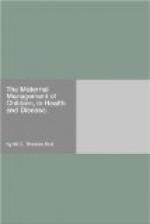Women who marry comparatively late in life, and bear children, generally have a deficiency of milk after the second or third month: artificial feeding must in part be here resorted to.
THE INJURIOUS EFFECTS TO THE MOTHER AND INFANT OF UNDUE AND PROTRACTED SUCKLING.
Upon the mother.—The period of suckling is generally one of the most healthy of a woman’s life. But there are exceptions to this as a general rule; and nursing, instead of being accompanied by health, may be the cause of its being materially, and even fatally, impaired. This may arise out of one of two causes, either, a parent continuing to suckle too long; or, from the original powers or strength not being equal to the continued drain on the system.
Examples of the first class I am meeting with daily. I refer to poor married women, who, having nursed their infants eighteen months, two years, or even longer than this, from the belief that by so doing they will prevent pregnancy, call to consult me with an exhausted frame and disordered general health, arising solely from protracted nursing, pursued from the above mistaken notion.
I most frequently meet with examples of the second class in the delicate woman, who, having had two or three children in quick succession, her health has given way, so that she has all the symptoms arising from undue suckling, when perhaps the infant at her breast is not more than two or three months old.
Since the health of the mother, then, will suffer materially from this circumstance, she ought not to be ignorant of the fact; so that, when the first symptoms manifest themselves, she may be able to recognise their insidious approach; and tracing them to their real cause, obtain medical advice before her health be seriously impaired.
Symptoms.—The earliest symptom is a dragging sensation in the back when the child is in the act of sucking, and an exhausted feeling of sinking and emptiness at the pit of the stomach afterwards. This is soon followed by loss of appetite, costive bowels, and pain on the left side; then, the head will be more or less affected, sometimes with much throbbing, singing in the ears, and always some degree of giddiness, with great depression of spirits.
Soon the chest becomes affected, and the breathing is short, accompanied by a dry cough and palpitation of the heart upon the slightest exertion. As the disease advances, the countenance becomes very pale, and the flesh wastes, and profuse night perspirations, great debility, swelling of the ankles, and nervousness ensue. It is unnecessary, however, to enter into a more full detail of symptoms.
Treatment.—All that it will be useful to say in reference to treatment, is this; that, although much may be done in the first instance by medicine, change of air, cold and sea bathing, yet the quickest and most effectual remedy is to wean the child, and thus remove the cause.




